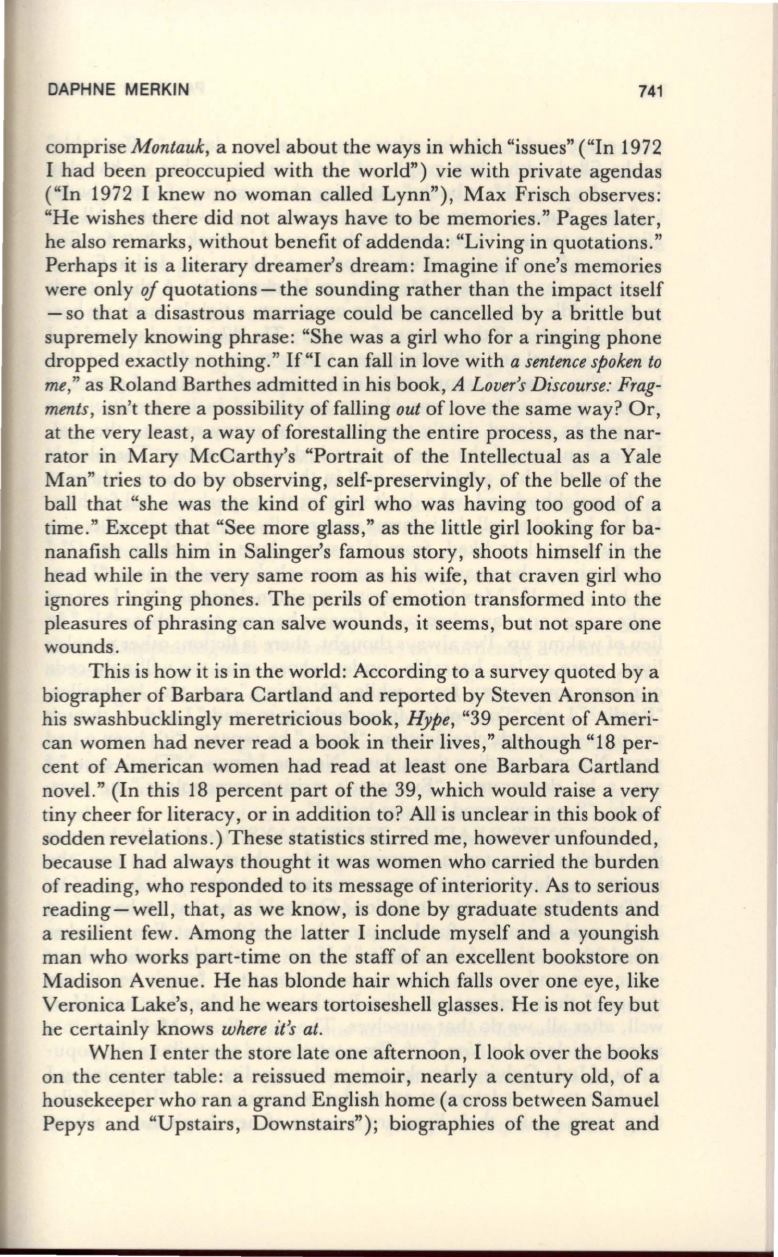
DAPHNE MERKIN
741
comprise
Montauk,
a novel about the ways in which "issues" ("In 1972
I had been preoccupied with the world") vie with private agendas
("In 1972 I knew no woman called Lynn"), Max Frisch observes:
"He wishes there did not always have to be memories." Pages later,
he also remarks, without benefit of addenda: "Living in quotations."
Perhaps it is a literary dreamer's dream: Imagine if one's memories
were only
of
quotations- the sounding rather than the impact itself
-so that a disastrous marriage could be cancelled by a brittle but
supremely knowing phrase: "She was a girl who for a ringing phone
dropped exactly nothing." If"I can fall in love with
a sentence spoken to
me,"
as Roland Barthes admitted in his book,
A Lover's Discourse: Frag–
ments,
isn't there a possibility of falling
out
of love the same way? Or,
at the very least, a way of forestalling the entire process, as the nar–
rator in Mary McCarthy's "Portrait of the Intellectual as a Yale
Man" tries to do by observing, self-preservingly, of the belle of the
ball that "she was the kind of girl who was having too good of a
time." Except that "See more glass," as the little girl looking for ba–
nanafish calls him in Salinger's famous story, shoots himself in the
head while in the very same room as his wife, that craven girl who
ignores ringing phones. The perils of emotion transformed into the
pleasures of phrasing can salve wounds, it seems, but not spare one
wounds.
This is how it is in the world: According to a survey quoted by a
biographer of Barbara Cartland and reported by Steven Aronson in
his swashbucklingly meretricious book,
Hype,
"39 percent of Ameri–
can women had never read a book in their lives," although "18 per–
cent of American women had read at least one Barbara Cartland
novel." (In this 18 percent part of the 39, which would raise a very
tiny cheer for literacy, or in addition to? All is unclear in this book of
sodden revelations.) These statistics stirred me, however unfounded,
because I had always thought it was women who carried the burden
of reading, who responded to its message of interiority. As to serious
reading-well, that, as we know, is done by graduate students and
a resilient few. Among the latter I include myself and a youngish
man who works part-time on the staff of an excellent bookstore on
Madison Avenue. He has blonde hair which falls over one eye, like
Veronica Lake's, and he wears tortoiseshell glasses. He is not fey but
he certainly knows
where it's at.
When I enter the store late one afternoon, I look over the books
on the center table: a reissued memoir, nearly a century old, of a
housekeeper who ran a grand English home (a cross between Samuel
Pepys and "Upstairs, Downstairs"); biographies of the great and


